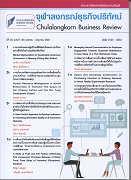Human Resource Management in Social Enterprises in Thailand: The Cases of Doi chaang Coffee and the Doi Tung Development Project
Main Article Content
Abstract
ABSTRACT
The objective of this research is to examine the following research question, “How do social enterprises motivate their employees to work toward the goals of these enterprises?” The qualitative research design, in particular the case study of two social enterprises in Thailand, i.e., Doi Chaang Coffee and the Doi Tung Development Project, was applied in this paper. Both social enterprises have been successful in their business operations in Thailand for some time and have been able to achieve both financial and social objectives at the same time. In this respect, the findings of this paper support the proposition that “Social enterprises in Thailand have motivated their employees to work toward the goals by paying more attention to intrinsic rewards than to extrinsic rewards”. These combined motivational practices support the contingency approach to human resource management and are different from best human resources practices or high performance human resources practices. The findings of this paper also have implications for practitioners and human resource professionals, especially managers of social enterprises. In particular, managers of these enterprises should implement appropriate motivational practices by creating good work environment, fostering sense of ownership, promoting pride in the organization, and developing commitment to the organization among their employees. These practices should finally motivate and retain their employees in the long term.
Article Details
Opinions and discussions in papers published by the Creative Business and Sustainability Journal (CBSJ) are deemed as personal opinions and the responsibility of the writers. They are not the opinions or responsibility of the Chulalongkorn Business School of Chulalongkorn University.
Papers, content, information etc. appearing in the Journal are deemed to be the copyright property of the Chulalongkorn Business School of Chulalongkorn University. Anybody or any organization that wishes to publish any part of them or use them in any way must obtain written permission from the Chulalongkorn Business School, Chulalongkorn University.


